WASHINGTON, D.C. -- Women worldwide are less confident than men in the honesty of elections, according to Gallup surveys in 125 countries in 2011. Forty-six percent of women say they are confident in the elections in their countries, compared with 48% of men. Confidence is greatest in high-income countries, but so is the gender gap, with 53% of women expressing confidence versus 61% of men.
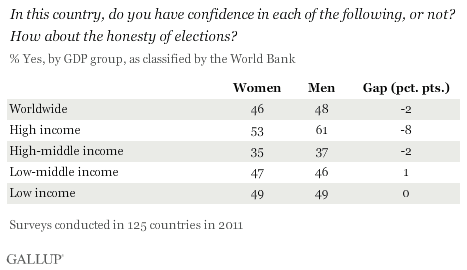
Women's and men's views about their elections tend to be more similar in high-middle, low-middle, and low-income countries. Confidence is lowest overall in high-middle income countries, where more than one in three of either gender trust their election process. Confidence is higher and similar to the global average in low-middle and low-income countries.
Regionally, gender gaps are widest in the Americas and Europe. Women in Europe are among the most confident worldwide in their elections, but at 53%, their confidence trails men's by five percentage points. The gender gap is similarly large in the Americas, but confidence among both genders is lower, at 37% among women and 43% among men. Men's and women's views are similar to each other in other regions.
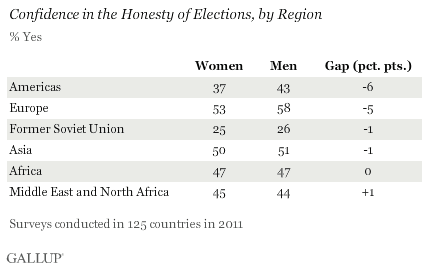
There are 14 countries where the gender gap in perceived honesty of elections is 10 points or higher. Ten of these are high-income nations, seven of them in Europe. The largest gender gaps worldwide are in Malta, Portugal, France, and Slovenia. In each of these four nations, except Malta, more than half of women are confident in the honesty of elections. In some cases, women are more likely than men to say they don't know or refuse to answer the question. Nonetheless, the overall pattern that emerges is one in which greater confidence in elections nationally often means a greater gender divide in perceptions of their honesty.
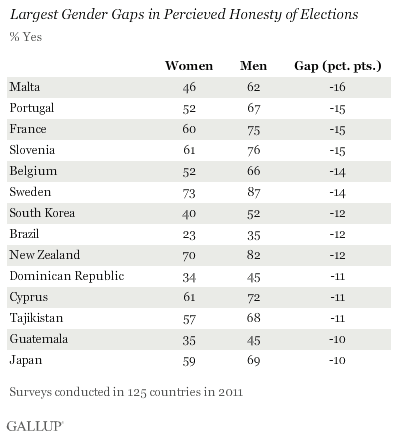
Women in "full democracies," as classified in the 2011 Democracy Index compiled by the Economist Intelligence Unit, also tend to be less confident than men in the honesty of their elections, regardless of their overall confidence. Women's confidence is among the highest globally in the Netherlands and Finland, at 80%, but the gender gaps of eight and seven points, respectively, are similar to that in the U.S., where overall confidence in elections is much lower. The U.S. joins Malta, South Korea, and the Czech Republic as the full democracies where less than a majority of women feel confident in the honesty of elections.
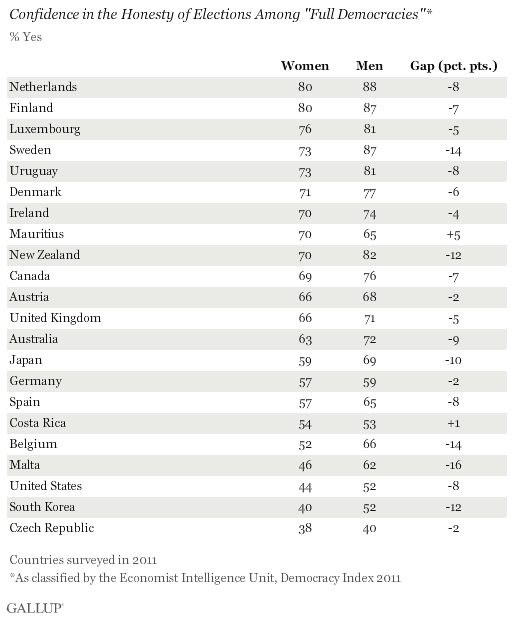
Neither Government Type Nor Women's Involvement in Government Predict Women's Confidence
There is no clear relationship between the type of democracy a country has or the percentage of women serving in government with women's perceived confidence in elections. The hybrid democracy of Cambodia and the authoritarian democracy of Laos rise to the top in overall confidence, with high confidence among both genders, but perhaps because many people answer positively out of fear. Women in the Netherlands and Finland are the most confident among full democracies, but women remain less confident than men despite holding a roughly four out of ten positions in government. Sweden is another example in which women express a high level of confidence and hold a large percentage of positions in government, but still, women's views trail men's by one of the largest gender gaps in the world.
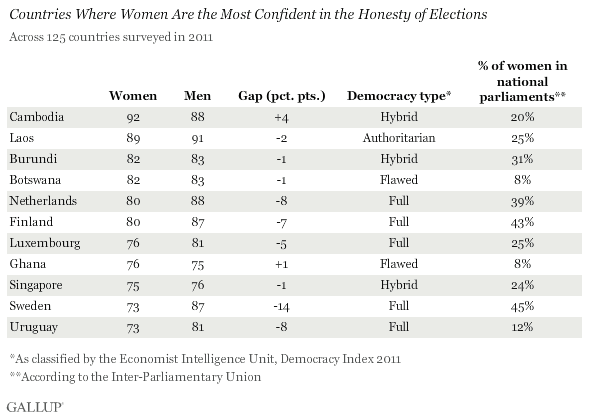
The nations where women are the least confident in the honesty of elections tend to be classified as something other than full democracies. Women in Haiti are the least confident across the 125 countries surveyed, followed by women in Mongolia and Armenia.
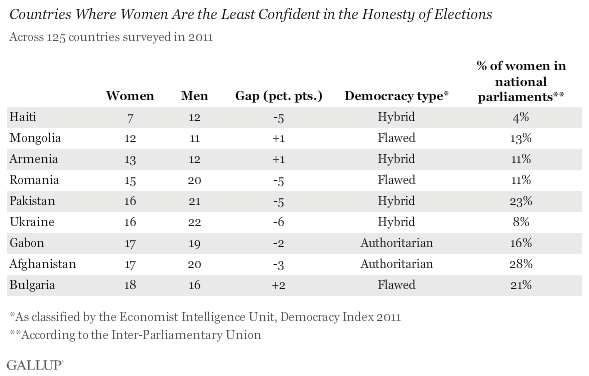
Implications
Despite being perceived as world leaders in many respects, high-income countries and full democracies have for the most part been unable to earn women's faith in elections to the same degree as men's. Women's lower confidence could inhibit their levels of civic engagement, political participation, and desire to seek roles in government, hindering progress toward gender inequality on other levels.
The fact that the gender divide is largest in high-income countries reflects the continuation of a phenomenon Gallup has also documented in terms of women's employment and perceptions of safety. The findings remind leaders that when a society progresses, women's attitudes and behaviors do not necessarily improve to a similar degree as men's. Where both women and men express similarly negative views, leaders could pursue broad-based solutions to increase confidence in elections. In the case where large gender gaps exist, gender-based interventions may be warranted.
For complete data sets or custom research from the more than 150 countries Gallup continually surveys, please contact us.
Survey Methods
Results are based on telephone or face-to-face interviews with at least 1,000 adults per country, aged 15 and older, conducted during 2011 in 125 countries and areas. For results based on the total global sample, one can say with 95% confidence that the maximum margin of sampling error is less than ±1 percentage point. For results based on country-level samples, the margin of error ranges from a low of ±2 percentage points to a high of ±9 percentage points. The margin of error reflects the influence of data weighting. In addition to sampling error, question wording and practical difficulties in conducting surveys can introduce error or bias into the findings of public opinion polls.
For more complete methodology and specific survey dates, please review Gallup's Country Data Set details.

